

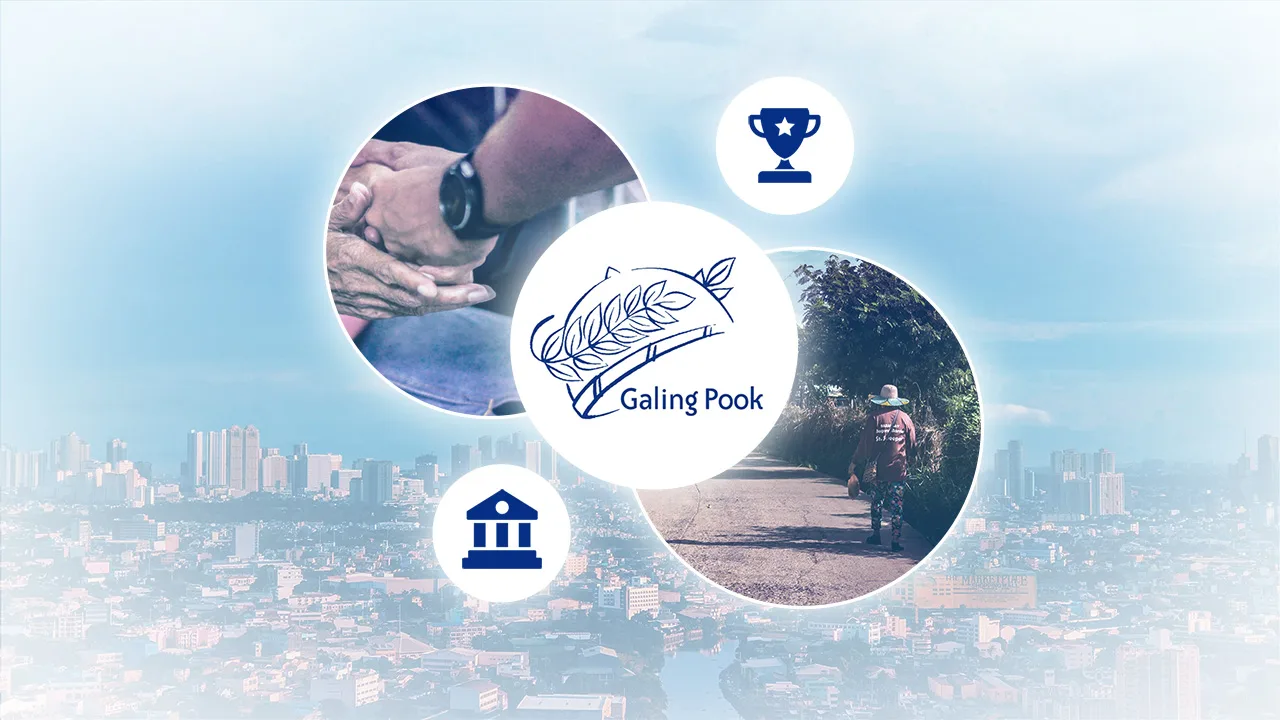
Apr 24, 2024 6:07 PM PHT
By: James Patrick Cruz
Rappler
Which city, municipality, and province has the most Galing Pook awards?
Local governments, despite their scale and resource limitations compared to their national counterparts, wield significant influence within their communities.
From fixing roads, ensuring clean streets, and maintaining peace and order, they are the frontline responders to the needs of their residents.
The impact of local governments, however, stretches far beyond these basic responsibilities, with many innovating to deliver better services to their constituents.
To recognize the best practices of local governments, the Galing Pook Awards was launched on October 21, 1993.
Since then, the Galing Pook Foundation has recognized 357 programs from 230 local government units.
Rappler looked at which cities, municipalities, and towns have the most number of Galing Pook awards, exemplifying best practices in local governance.
Bulacan stands out with 11 Galing Pook awards, making it the most recognized province as of 2023.
One of the province’s programs awarded by Galing Pook is the Lakas ng Kabataan sa Bulacan through the Provincial Youth Development Council. This initiative fosters capacity-building for unemployed adults, out-of-school youth, and high school graduates, enhancing their competitiveness and employability.
Galing Pook Executive Director Georgina Ann Hernandez Yang linked the province’s multiple awards to the exceptional leadership of its local chief executives former Governor Obet Pagdanganan and Governor Josie Dela Cruz.
She said they empowered the bureaucracy, overseen by Ma. Gladys Cruz-Sta. Rita, former provincial administrator of the Provincial Government of Bulacan, whose 17-year tenure ensured the sustainability of the programs.
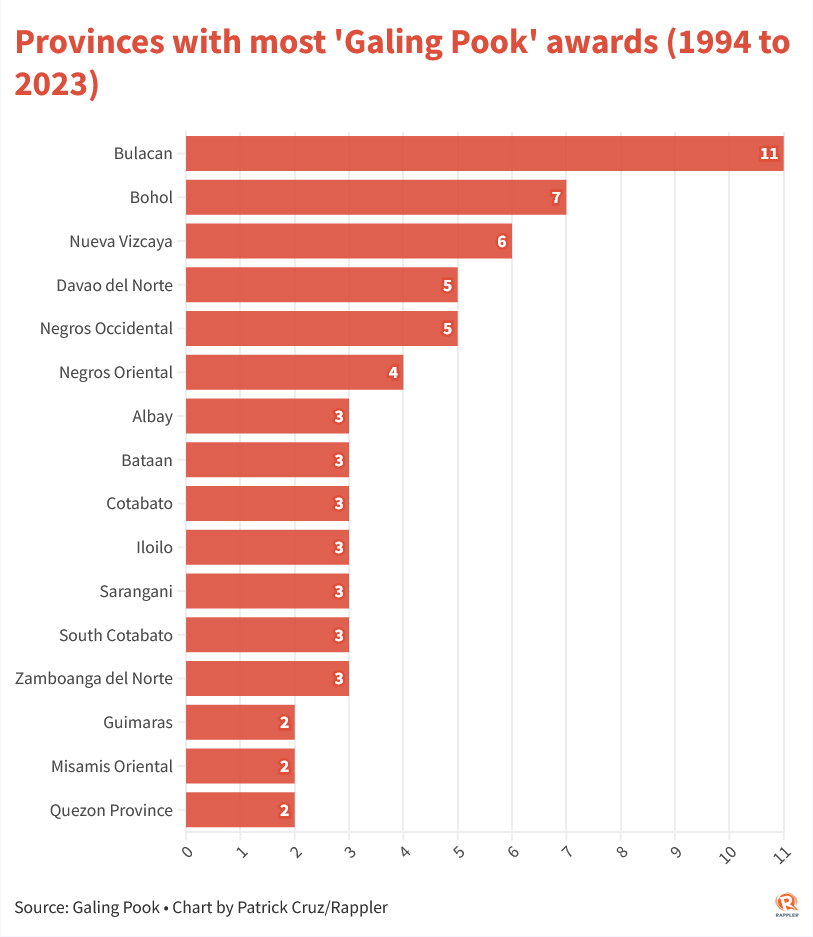
Yang said that having a long-term “provincial administrator gives that continuity and stability and also that culture of excellence in local governance.”
“Local chief executives cycle in and out after each election year but it’s good to have that stability of a local government manager, like a COO,” Yang said.
“It gives us an insight into professionalizing the local government bureaucracy,” she added.
Based on the Local Government Code, the term of a provincial administrator is coterminous with that of his appointing authority, the governor.
Following Bulacan, Bohol claims seven awards, while Nueva Vizcaya holds six. Davao del Norte and Negros Occidental both boast of five awards, and Negros Oriental has four.
Several other provinces, including Albay, Bataan, Cotabato, Iloilo, Sarangani, South Cotabato, and Zamboanga del Norte, have been recognized with three awards. Guimaras, Misamis Oriental, and Quezon Province have earned two.
Naga leads among Philippine cities with 11 Galing Pook awards.
Under then-mayor Jessie Robredo’s tenure, the city earned 10 awards, including recognition for the People Empowerment Program in 2002.
This initiative enables public participation in local governance across various areas such as procurement, budgeting, and policy deliberation through the Naga City People’s Council. This was institutionalized through a city ordinance.
Representatives of the council gained authority to propose legislation and participate in committee-level voting within the Sangguniang Panlungsod or city council.
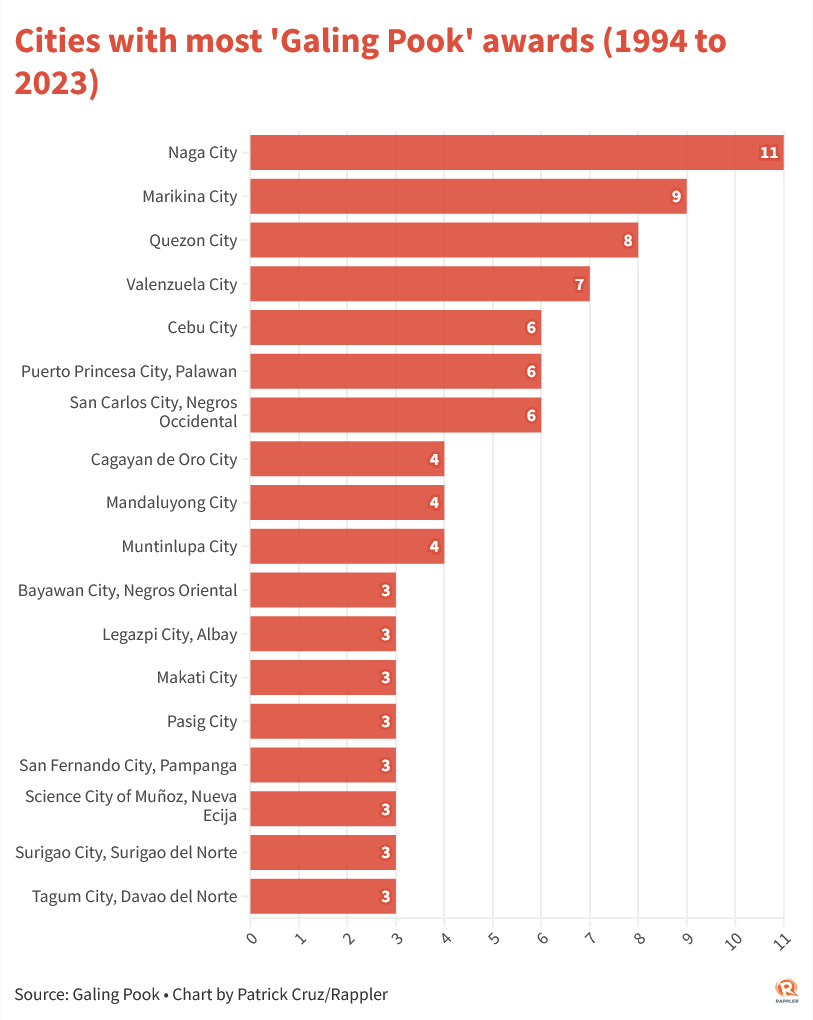
Marikina City trails Naga with nine Galing Pook recognitions, mostly under the late Mayor Bayani Fernando. One of its outstanding initiatives is the “bicycle-friendly city” program.
Its bike-friendly initiatives date back to 1999, “building a network of dedicated bike lanes within its boundaries.” In 2005, Marikina’s biking program received recognition from Galing Pook.
Quezon City, another top awardee, holds eight recognitions. One of its latest programs to be recognized is the Intelligent, Resilient, and Integrated Systems for the Urban Population or iRISE UP.
This system provides real-time monitoring of weather, gives rain forecasts, updates on the level of flooding, heat index, and temperature per barangay, and detects earthquakes.
Among the most lauded cities, Yang noticed a pattern of the mayors of these cities mostly coming from the same family like the Gathchalian brothers of Valenzuela (Rex and Win) and the Fernando couple of Marikina (Bayani and Marides).
She also cited former Quezon City mayor Feliciano Belmonte Jr. and his daughter and incumbent local chief executive Joy Belmonte as another example.
“Perhaps we could say that the continuity of that excellence (in the city) was in the sense because they came from the same family so somehow the program continues,” Yang said.
She noted, however, that beyond family ties, shared values concerning excellent service delivery, positive impact, and people empowerment are ultimately crucial in maintaining good local governance.
Among the 1,486 municipalities in the country, the Municipality of Malalag in Davao del Sur boasts of four Galing Pook awards.
It first secured recognition from the foundation in 1995 for the town’s development program to transform Malalag into a “provincial agri-industrial center.”
Following Malalag, several towns, including Alimodian in Iloilo, Goa in Camarines Sur, Guagua in Pampanga, Irosin in Sorsogon, and Magsaysay in Davao del Sur have each earned three Galing Pook awards.
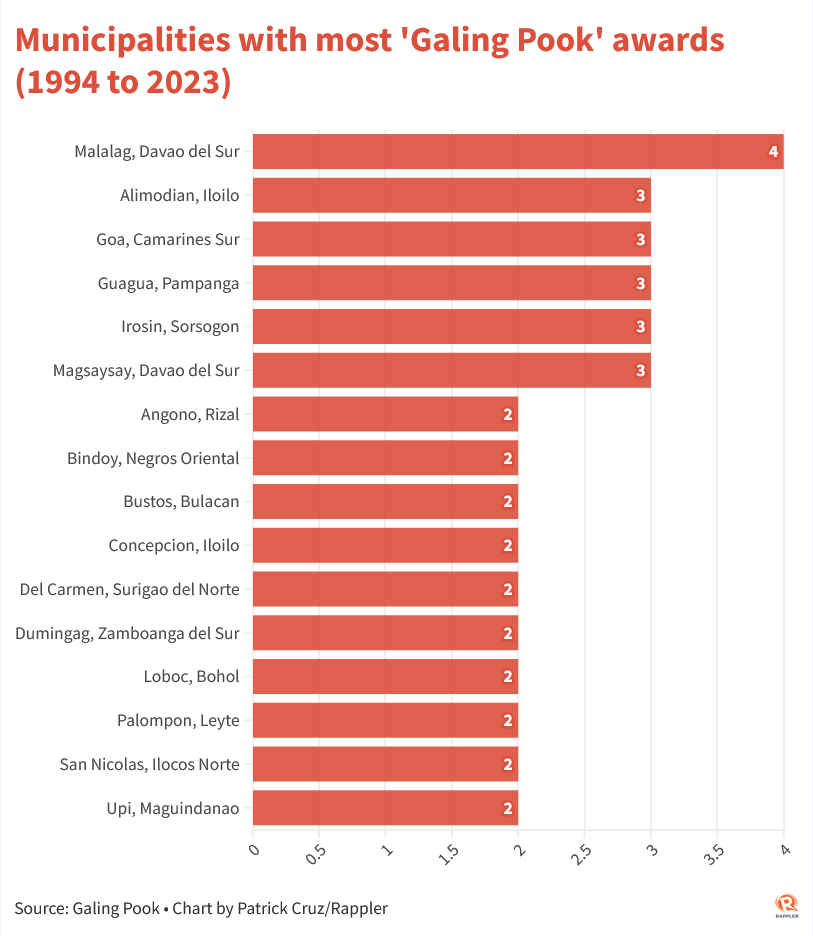
Since its inception, most of the programs recognized by the Galing Pook Awards are environment-related, totaling 66.
This trend, according to Yang, stems from the different environmental concerns of different communities across the country.
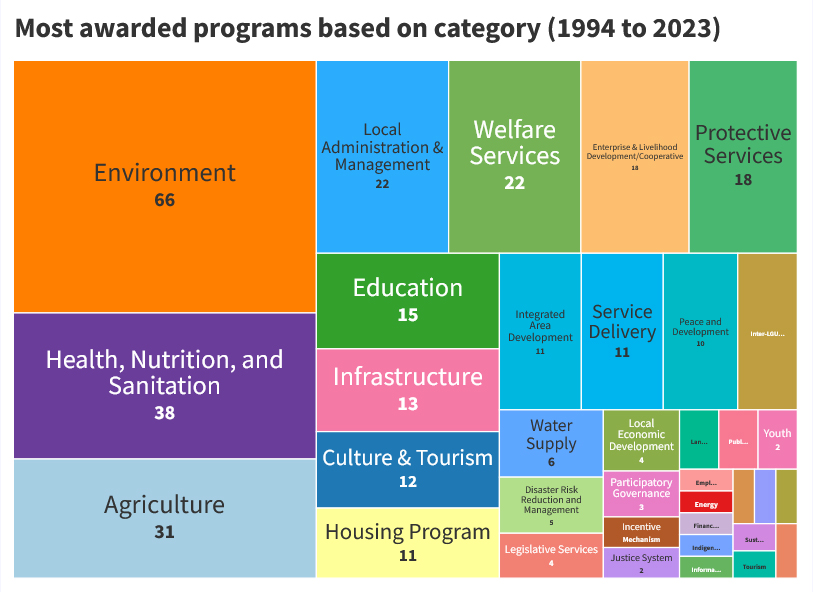
The winners of the Galing Pook Awards are pulled from applicants across the country.
Each program undergoes “rigorous screening” by the foundation’s secretariat and the National Selection Committee. Those with high potential are chosen.
The final step involves the presentation of programs by local chief executives and/or program officers before the Final Board of Judges.
After the first screening, the program is validated and deliberated on by the Galing Pook panel.
To qualify for the Galing Pook Awards, a program must:
Qualified programs are evaluated based on the following criteria:
Yang underscored the crucial role of local governments in addressing community issues and serving as models for national leadership.
“The local governments have the most direct impact on people in the communities, especially on addressing issues on poverty inequality, and promoting economic development, addressing issues on climate and disaster risk reduction,” the Galing Pook executive director said.
Aside from the leadership and governance of the local chief executives, Yang also highlighted the importance of empowering the local government workers and the citizens.
“We have so much to learn and so much to benefit from when we give more spotlight and when we learn more from our local chief executives and their teams and their communities,” Yang said. – Rappler.com
Source: Rappler.com